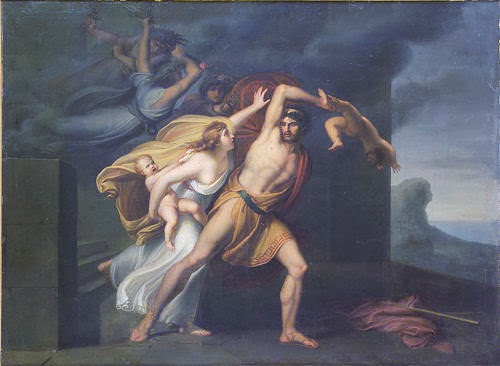
Ino was a queen of Thebes in Greek mythology, the daughter of Cadmus and Harmonia. She was the second wife of King Athamas, with whom she had two children, Learches and Melicertes. Her sisters were Agave, Autonoe, and Semele, who was the mother of the god Dionysus.
Ino hated Athamas' children from his first marriage with the goddess Nephele, especially the twins Phrixus and Helle. So, she devised a plot to kill them. She collected all crop seeds from the region and roasted them. The farmers, seeing that their crops wouldn't grow and afraid of famine, sent messengers to a nearby oracle for advice. Ino bribed the messengers to say that the oracle demanded the sacrifice of the twins. Athamas reluctantly agreed, and everything was prepared for the sacrifice. However, just before the children were killed, their natural mother Nephele sent a flying golden ram to save them. Phrixus Helle were told never to look down while flying on the ram, but at some point, Helle ignored her mother's advice and fell to her death. The patch of sea where Helle died later took her name and has been called Hellespont since then. Phrixus survived the flight and reached Colchis, where the king Aeetes welcomed him; Phrixus, grateful for the hospitality, gave the golden fleece of the ram as a gift to the king, which would later be the object of desire for Jason and the Argonauts.
Ino helped raise her nephew Dionysus, causing Hera's jealousy. Hera caused Athamas to get mad, thus killing one of his sons, Learches; Ino, in an attempt to escape, took her other son Melicertes, and together fell into the sea. Due to this event, Ino was later deified and was worshipped as the goddess Leucothea, while Melicertes became the god Palaemon. Athamas regained his sanity and fled, and later married Themisto with whom he had a number of children. When he returned to Ino, he caused Themisto's jealousy, who devised a plot to kill Ino's children. She dressed Ino's children in black and her own in white, and paid to have the children in black killed. However, Ino had switched the clothes among the children, and Themisto's children were killed instead.
Comments
Post a Comment